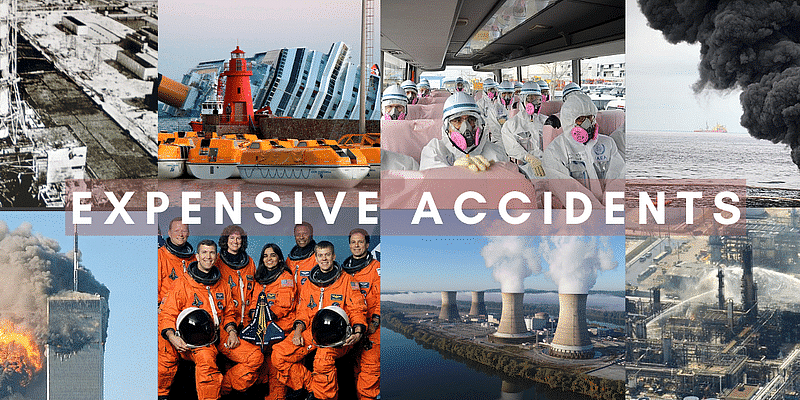Accidents can have far-reaching consequences, affecting lives, ecosystems, and economies. Some incidents have incurred staggering financial costs, leaving lasting impacts on societies and the environment. In this article, we delve into the most expensive accidents in history, highlighting their significance, the magnitude of their financial impact, and the lessons learned from these catastrophic events.
Deepwater Horizon Oil Spill (2010) – Estimated Cost: $61.6 Billion:
The Deepwater Horizon oil spill, considered the costliest accident in history, occurred in the Gulf of Mexico. An explosion on the drilling rig resulted in an uncontrolled release of oil, causing extensive environmental damage and economic repercussions. The costs associated with the cleanup, legal settlements, and compensation payments have contributed to the colossal financial toll.
Fukushima Nuclear Disaster (2011) – Estimated Cost: $360 Billion:
The Fukushima Daiichi nuclear disaster in Japan was triggered by a powerful earthquake and tsunami. The meltdowns of three reactors released radioactive materials and caused significant damage to surrounding areas. The economic losses include the costs of evacuating and compensating affected residents, decommissioning the reactors, and long-term environmental remediation.
Chernobyl Disaster (1986) – Estimated Cost: $235 Billion:
The Chernobyl nuclear disaster in Ukraine stands as one of the most catastrophic accidents in history. The explosion and subsequent radioactive fallout led to widespread human casualties, long-term health effects, and significant economic and environmental damage. The costs associated with containment, cleanup, resettlement, and healthcare for affected individuals have contributed to the immense financial impact.
9/11 Terrorist Attacks (2001) – Estimated Cost: Over $83 Billion:
The terrorist attacks on September 11, 2001, not only caused immense loss of life but also had significant financial consequences. The destruction of the World Trade Center towers, damage to the Pentagon, and the resulting economic downturn resulted in substantial costs. These costs include the rebuilding of infrastructure, insurance claims, compensation for victims’ families, and increased security measures.
Space Shuttle Columbia Disaster (2003) – Estimated Cost: Over $13 Billion:
The loss of the Space Shuttle Columbia during re-entry was a devastating blow to the space program. The accident, caused by damage to the heat-resistant tiles on the shuttle’s wing, prompted a reassessment of safety protocols. The incident incurred additional costs for investigation, recovery, and the subsequent grounding of the shuttle fleet.
Exxon Valdez Oil Spill (1989) – Estimated Cost: Over $5 Billion:
The Exxon Valdez oil spill in Alaska’s Prince William Sound had severe environmental and economic repercussions. The grounding of the tanker released millions of gallons of crude oil, necessitating extensive cleanup efforts, legal settlements, and addressing long-term ecological damage.
Piper Alpha Oil Rig Explosion (1988) – Estimated Cost: $3.4 Billion:
The Piper Alpha oil rig explosion in the North Sea remains one of the deadliest offshore oil accidents. The incident caused the loss of 167 lives, extensive environmental damage, and substantial financial losses for the oil industry. The costs involved cleanup operations, legal settlements, and improved safety measures in the industry.
Costa Concordia Cruise Ship Disaster (2012) – Estimated Cost: Over $2 Billion:
The sinking of the Costa Concordia cruise ship off the coast of Italy resulted in the loss of 32 lives and extensive damage to the vessel. Salvage operations, legal settlements, and compensation for victims incurred significant costs for the ship’s owners and the tourism industry.
Texas City Refinery Explosion (2005) – Estimated Cost: Over $1.6 Billion:
The explosion at the BP-operated Texas City Refinery in Texas, USA, caused significant human casualties and extensive damage. The costs included compensation for victims, legal settlements, and improved safety measures in the petrochemical industry.
Three Mile Island Nuclear Accident (1979) – Estimated Cost: Over $1 Billion:
The partial meltdown at the Three Mile Island nuclear power plant in Pennsylvania, USA, raised concerns about nuclear energy safety. The accident incurred substantial costs for cleanup, investigations, and improving safety protocols.
These incidents serve as stark reminders of the devastating consequences accidents can have, not only in terms of loss of life but also the immense financial burdens they bring. The Deepwater Horizon oil spill, Fukushima nuclear disaster, and Chernobyl disaster top the list as the costliest accidents, leaving lasting impacts on the environment, human health, and economies. The lessons learned from these events emphasize the importance of prevention, stringent safety measures, and continuous efforts to minimize risks in various sectors. It is through these endeavors that we strive to prevent future catastrophic accidents and their astronomical financial consequences.










